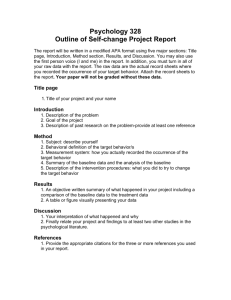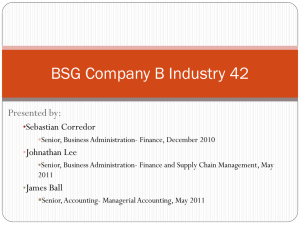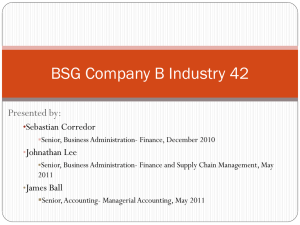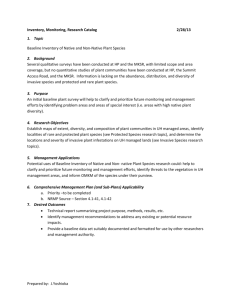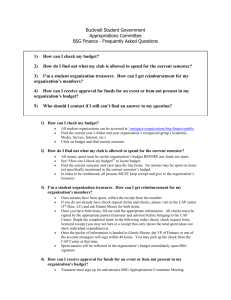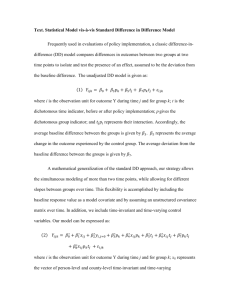BSG-FSEG - Canadian Network of NGOs in Ethiopia (CANGO)
advertisement
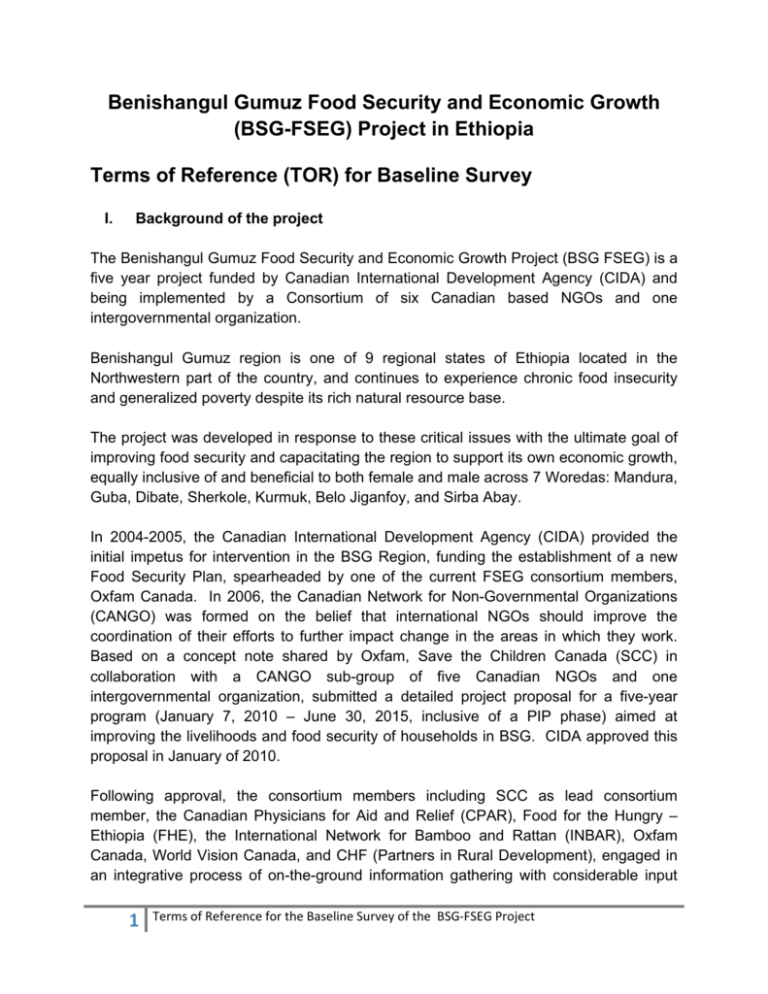
Benishangul Gumuz Food Security and Economic Growth (BSG-FSEG) Project in Ethiopia Terms of Reference (TOR) for Baseline Survey I. Background of the project The Benishangul Gumuz Food Security and Economic Growth Project (BSG FSEG) is a five year project funded by Canadian International Development Agency (CIDA) and being implemented by a Consortium of six Canadian based NGOs and one intergovernmental organization. Benishangul Gumuz region is one of 9 regional states of Ethiopia located in the Northwestern part of the country, and continues to experience chronic food insecurity and generalized poverty despite its rich natural resource base. The project was developed in response to these critical issues with the ultimate goal of improving food security and capacitating the region to support its own economic growth, equally inclusive of and beneficial to both female and male across 7 Woredas: Mandura, Guba, Dibate, Sherkole, Kurmuk, Belo Jiganfoy, and Sirba Abay. In 2004-2005, the Canadian International Development Agency (CIDA) provided the initial impetus for intervention in the BSG Region, funding the establishment of a new Food Security Plan, spearheaded by one of the current FSEG consortium members, Oxfam Canada. In 2006, the Canadian Network for Non-Governmental Organizations (CANGO) was formed on the belief that international NGOs should improve the coordination of their efforts to further impact change in the areas in which they work. Based on a concept note shared by Oxfam, Save the Children Canada (SCC) in collaboration with a CANGO sub-group of five Canadian NGOs and one intergovernmental organization, submitted a detailed project proposal for a five-year program (January 7, 2010 – June 30, 2015, inclusive of a PIP phase) aimed at improving the livelihoods and food security of households in BSG. CIDA approved this proposal in January of 2010. Following approval, the consortium members including SCC as lead consortium member, the Canadian Physicians for Aid and Relief (CPAR), Food for the Hungry – Ethiopia (FHE), the International Network for Bamboo and Rattan (INBAR), Oxfam Canada, World Vision Canada, and CHF (Partners in Rural Development), engaged in an integrative process of on-the-ground information gathering with considerable input 1 Terms of Reference for the Baseline Survey of the BSG‐FSEG Project from the regional government, indigenous groups/organizations, and potential beneficiaries. The BSG FSEG Project will engage the region, zone, district sector offices, communities, households and individuals in their own sustainable development, specifically with respect to the improvement of food security and access to/participation in a variety of economic activities and commercial markets. This will increase the capacity of participants to contribute directly or indirectly to their own continuous economic growth as well as that of the region and of Ethiopia. In order to achieve and sustain broad based growth through transforming the agriculture sector, a multi-pronged approach must be considered. While this approach is effective in developing common methodologies to work towards a common goal, clearly focused and appropriately resourced activities are essential in maximizing identified leverage points to achieve growth. Based on the learning from the 2005 Food Security Program, which itself was very broad in scope, there is considerable knowledge of how specific sectors and sub-sectors will better contribute to improving the food security situation in the region of BSG. The consortium will build on agency expertise in the sub-sector areas of agriculture, market-led development, Nutrition, Disaster risk reduction, Environmental resource management and sustainability, gender mainstreaming, resulting in an innovative and aggressive program that views capacity building as essential in the success of the transformation process for improved and sustainable availability and utilization of food, and increased and sustained income of communities in the Region. II. The expected Results of the project The BSG FSEG project team consulted with regional, zonal and woredas -level officials as well as community members to determine achievable and measurable results, which will contribute to the ultimate goal. The five-year project will directly impact approximately 60% of the population of the targeted woredas, a total of 20,500 food insecure households. At the end of these 5 years, the project will have: increased awareness of environmental sustainability and natural resource use as well as risk management; improved household access to markets and other income generating opportunities; increased awareness and mainstreamed gender equality at all levels of the social structure; improved food security and nutrition through increased diversity and production as well as awareness-raising; improved vertical integration enhancing the capacity of all levels, household to regional government for independently plan, and 2 Terms of Reference for the Baseline Survey of the BSG‐FSEG Project implement development initiatives. Beyond the life of the project, it is intended that these tangible changes will continue to progress and proliferate within as well as beyond the borders of the selected woredas of Benishangul Gumuz. Ultimate Outcome: Improved food security and economic growth for women and men in Benishangul Gumuz Intermediate Outcomes: 1. Improved and sustainable availability and utilization of food for women and men in 7 woredas 2. Increased and sustained income (especially for women) in 7 woredas Immediate Outcomes: 1. Increased and diversified crop and livestock productivity for male and female producers 2. Improved natural resource management 3. Improved dietary diversity and quality for target households with a special focus on women and children 4. Improved institutional and community capacity to plan and manage gender sensitive and sustainable livelihoods programming 5. Improved participation by households particularly women members of households and communities to market-oriented activities and value-chains linked to markets for income growth 6. Increased capacity of female and male producers, communities, civil society, public and private sector to support and engage in gender-sensitive, agroenterprise and market-based initiatives. III. Purpose and objectives of the baseline survey The purpose of the baseline survey will be to gather data to help the BSG FSEG project implementing partners formulate a clear understanding of the current livelihood and food security situation in the seven targeted woredas in Benishangul Gumuz region in order to implement an effective and targeted food security and economic growth project. The overall objective of the baseline survey is to build on information existing in the current Performance Measurement Framework on the Food Security and Economic Growth levels in seven woredas in the BSG region in Ethiopia. The baseline study will collect, organize and analyze information on the project thematic areas in targeted geographic for designing and implementation of comprehensive monitoring and 3 Terms of Reference for the Baseline Survey of the BSG‐FSEG Project evaluation system that will contribute in effective delivery of activities to achieve the six immediate outcomes and ultimately to ensure Improved and sustainable availability and utilization of food for women and men in 7 woredas. The availability of the baseline information will allow the project also gauge the overall progress made by the Consortium as ‘one program’ on an annual basis. Information obtained will be incorporated into the Project Implementation Plan (to the Performance Measurement Framework - PMF). The information obtained will also be used as the basis to determine indicators, targets, data sources, data collection methods, frequency and responsibilities of data collection in the existing PMF. The BSG FSEG project aims at contracting a consultant/consulting firm for an assignment that will be conducted in coordination with the Project’s M & E Coordinator and a reference group nominated by the Management Advisory Team (MAT). More specifically, the consultant/consulting firm will assist the project to fine tune the indicators, to improve participatory data gathering and data analysis methods and suggest adjustments that would enrich respective woreda action plans. In reference to the Performance Measurement Framework (PMF), each thematic area will set benchmarks and targets that will be built using data collected as a baseline and that will facilitate monitoring over the course of the project. It is expected that the baseline survey data will allow measurement of the progress and effectiveness of project interventions on household livelihoods. IV. Methodology and Sampling The baseline study will be conducted using participatory approaches and will be comprised of a desk review and field visits. The desk study will include reviews and analysis of documents, reports and studies that have been produced by the consortium members in connection with the BSG FSEG programming particularly the capacity building of the local institutions, organizations, agencies in the BSG region with which the project is expected to collaborate in delivering project activities. The study will also include documents produced by the government, CIDA and other agencies in connection with food security, economic growth and livelihood. The field visits will include interviews, focused group discussions among other participatory methods with households, community based organizations, and local authorities in woredas. Further, interviews should be made with specific institutes (such 4 Terms of Reference for the Baseline Survey of the BSG‐FSEG Project as Farmer Training Centers, Veterinary Centers, and woreda Women’s Affairs Offices) that the Consortium will work in close collaborations in capacity building in the BSG region. This being a participatory baseline study, the exact methodology will be designed with input from the consultant, (working closely with M&E project staffs) but will build upon work already undertaken by the consortium members while preparing the Project Implementation Plan (PIP). The proposed design must meet the programming needs of the consortium –thematic and geographic leads. At all stages of the survey including design, socialization, the survey exercise, the consultant, in collaboration with the reference group shall seek extensive participation and solicit inputs and ideas from all relevant stakeholders (regional and local government, consortium members, kebele and community representatives) and more so inclusion of women at all levels. V. Services and deliverables Perform a baseline survey that utilizes data collection techniques (preferable using Personal Digital Assistants’’ - PDA’s), while incorporating both quantitative and qualitative methods in establishing key livelihood findings and indicators. Data collected and provided by consultant should be in a form that the consortium M&E staffs can use to develop M&E framework and appropriate tools which should feed into the M&E components and methodology in PIP. The data should also be gender disaggregated in a manner that the project can systematically monitor the progress of the expected results. Propose a participatory methodology in developing the experimental design required for undertaking a baseline survey for livelihood and food security within the 7 woredas. This should entail evaluating the thematic focus of the project within the targeted woredas, and determining the appropriate sampling methodology required. The proposed survey design must have sufficient rigor for ensuring the information reported is within the confidence levels required by all parties. Develop the necessary documentation/questionnaires for undertaking the survey in consultation with each thematic lead member of the project. Sufficient pretesting regime will be required to verify the questionnaire is suitable for generating the information required. Develop a finalized model for the baseline survey indicating the sampling regime for the proposed study areas; a tested questionnaire; data base and a proposed timeline for undertaking the study. Ensure a participatory process in selection of enumerators who will be trained on data collection techniques (preferably using PDAs), reporting and analysis. 5 Terms of Reference for the Baseline Survey of the BSG‐FSEG Project VI. Oversee survey implementation in the target areas – Woreda and Kebeles. Develop an appropriate data base and undertake analysis of the data generated, Provide statistically significant information regarding the overall livelihood and food security status in the target areas. Make suggestions for future data collection and evaluation, Identify and compile data gaps related to the PMF and recommend steps to close the gaps through additional data collection or the use of alternative indicators Identify of key issues and potential constraints for collection of data to measure the progress and make recommendations for gathering of reliable statistics/data that can be compared with performance indicators Provide a comprehensive, clear, and detailed report that includes baseline benchmarks for designing/ finalizing relevant indicators mentioned in PMF for each of expected results. Stakeholder Involvement Stakeholder participation is fundamental to this BSG FSEG baseline survey. The Consultant is expected to conduct a participatory survey providing for meaningful involvement by consortium and government partners, beneficiaries and other interested parties. Stakeholder participation is to be an integral component of the baseline survey design and planning; information collection; the development of findings; reporting; and results dissemination VII. Report and presentation The consultant should produce three major outputs: a. A finalized participatory model and methodology for conducting the baseline survey indicating the sampling regime for the proposed study areas - a tested questionnaire, a data base and, a proposed timeline for undertaking the study. b. A draft report to be shared in a half day workshop with project staff and stakeholders, so as to gather feedback and validation. The draft report and workshop should also share indicators, as fine-tuned, and baseline data as gathered and analyzed c. A final report, including an overview of the applied methodology; a clear presentation of quantitative/qualitative data ascertained; specific findings including indicators and baseline data referencing to the PMF as well as the specific thematic focus of the project. A specific table of contents for this report will be developed so as to ensure clear presentation of the findings. 6 Terms of Reference for the Baseline Survey of the BSG‐FSEG Project VIII. Duration of Assignment and Support The assignment will be for a total period of 45 days beginning April 1st, 2011. In fulfilling her/his responsibilities, the Consultant will coordinate with the project’s M&E Coordinator and the reference group nominated by the Management Advisory Team (MAT) as stated earlier in the TOR. On behalf of the project, SCC will enter the contract with the consultant and will be the lead contact. SCC will cover costs for and make all local travel arrangements and provide the consultant with office space and accommodation as required. The project shall introduce the consultant to the key contacts for this work and make necessary organizational arrangements. They will provide the consultant with all necessary background information and other documents related to this project including the already existing documents compiled during the PIP period. For this assignment the Consultant will be required to work on weekends.The Consultant shall at all times follow security rules and regulations as established by the project. IX. Staffing -Competency and expertise required Required: This base line survey needs multidisciplinary team who must have; Relevant university degree in social sciences, agriculture or nutrition sciences, or equivalent experience. Fully acquainted with CIDA's results-based management orientation and practices. Previous experience in using a participatory approach to conduct Livelihoods and food security assessments (holistic or multi-sectoral programming) particularly in the BSG region Previous experience in natural resource management, economic growth and gender analysis. Proven skills in data collection techniques, data analysis and statistics, using statistical software packages such as EPI-INFO, SPSS, STRATA etc. Ability to train, guide and supervise a team of field staff Ability to design and develop data bases Flexible and ability to work independently; Excellent communication & report writing skills in English Previous experience within the region; knowledge of the cultural & social background 7 Terms of Reference for the Baseline Survey of the BSG‐FSEG Project X. Support to the Consultant Day to day support to the Consultant(s) will be coordinated by SCC in consultation with other consortium partners. Communication relating to the management of logistics/finance for the consultancy will also be performed by SCC. Instruction for submission of proposal: Interested professions/ institutions are requested to submit the following; A letter of interest (LOI) with a short capacity statement of your organization or team. A brief proposal outlining how you plan to achieve the objectives as stated in the TOR along with recently updated CVs of professionals. Original signed CVs needs to be submitted. A separate financial proposal outlining the overall budget required to achieve the objectives of the TOR. The financial proposal should include all budget items including tax and other associated costs. The LOI and Technical Proposal should be in one sealed envelope marked “LOI and Technical Proposal for BSG FSEG Baseline” whilst the Financial Proposal should be in a separate sealed envelope marked “Financial Proposal for BSG FSEG Baseline”. Each envelops need to clearly identify the consultant/ institution from which the proposal has been sent. Please send the information requested above to the following address on or before March 21st, 2011 The Project Director Benishangul Food security and Economic Growth project C/o Save the Children Canada P.O Box 2304, Postal Code 1250 Addis Ababa, Ethiopia. Email: contact@savethechildrenca.org 8 Terms of Reference for the Baseline Survey of the BSG‐FSEG Project
